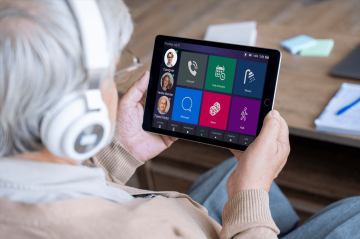5 tips on quick mental hygiene for caregivers
February 4, 2020

As a caregiver you are at a heightened risk of suffering from mental health problems such as anxiety and depression. Take care of yourself so you can take care of others. Read five tricks on how to keep your sanity as a professional caregiver.
According to the ADAA, an astonishing 40-70% of caregivers show symptoms of depression. Long hours, tedious tasks, demanding clients, and a multitude of other factors can contribute to caregiver burnout.
Take a moment and check in on how you’ve been doing lately. And be honest with yourself. Prioritizing your mental wellbeing helps you:
-
realize your full potential, cope with the stresses of life,
-
work productively
-
and make meaningful contributions to the communities around you.
These five mental health practices will help protect you from stress-related illnesses and establish the endurance you need for your job.
What is mental health?
MentalHealth.gov states that “Mental health includes our emotional, psychological, and social well-being. It affects how we think, feel, and act. It also helps determine how we handle stress, relate to others, and make choices. Mental health is important at every stage of life, from childhood and adolescence through adulthood.”
Get outdoors to recharge
Caring for someone who is elderly or ill often means staying inside for long periods of time.Just a quick walk around the block each day can help you freshen up a sluggish mind. Physical movement will raise your heart rate for a healthier mind and body.
Communicate your needs
You matter too. Don’t be afraid to say what you need from your employer or the elderly you are caring for. Open communication is key to having a calm, clear mind. Pride may stop us from being honest about how we are feeling. If you need a break, say so. If you believe that a change in the daily routine can help you both, let your care recipient know your suggestion.
There are two possible outcomes:
- You will get what you need and therefore feel better.
- You may not get the answer you expected, but you tried, and you can be proud of yourself.

Take your time to relax. Even half an hour with cup of tea and your favourite book may help.
Surround yourself with support
Loneliness can strike you just like your clients, because elderly isolation affects you, too. Spending most of the day caring for the elderly may not provide adequate socialization. And when you get home from work, you may feel too tired to talk to anybody, and just turn on the TV.
When you feel your work is overwhelming you:
- Confide in a colleague who can help you with a professional dilemma - they may be having the same experience as you.
- Enjoy friends, sports, and hobbies after a day spent caring for the elderly to ensure yourself the social and physical stimulation you need to stay healthy.
- Meet with a supportive friend who can patiently listen to the difficulties you face - it may be crucial when it comes to stress relief.
Keep a journal
Write it out! It'll help you heal and shake off some heavy issues and it is also a professional diary that will help you learn from past experience. If you keep track of your days in written form, you can always look back and gain inspiration from how you handled a particularly difficult day.
Seek professional help
If you find yourself stuck in a rut or if your mood hasn’t been improving or is even worsening, do not hesitate to seek help. Get evaluated by a mental health provider if you feel excessively tired, numb, sad, hopeless, angry, and experience changes in sleeping or eating for a period of two weeks or more.
Don’t waste one minute suffering in silence. Look for available therapists at the ADAA directory, where you can also find telemental therapy options. There are also professionals, such as therapists, psychiatrists and other mental health workers that form part of Mental Health America who are available to support you on your journey as a caregiver. Answer the questions on the Where to get help page for options on getting the support you need.
Keep on reading
Aging in the AI Age: How Technology is Redefining Senior Care
Discover how technology is transforming senior care in the AI Age. From remote health check-ins to cognitive stimulation and combating loneliness, this article explores how Oscar Senior helps care organizations deliver smarter, more connected, and compassionate care — with tools that are simple, accessible, and ready to use.
Oscar Senior + CogniEnhance
Oscar Senior has announced a new partnership with CogniEnhance, a leading cognitive stimulation platform. This collaboration brings personalized brain training into Oscar Senior’s digital care environment, helping organizations improve mental wellbeing, engagement, and independence among older adults — all within a seamless remote care experience.
Press Release: Oscar Senior Secures 1 Million USD in Funding for Oscar Family App and Tablet Bundle
Oscar Senior, a leading digital solutions provider focused on enhancing the lives of seniors and individuals with disabilities, proudly announces a significant financial milestone concurrent with the launch of Oscar Family. In a successful funding round, the company secured 1 million USD to support the innovative Oscar Family app bundled with a Samsung tablet.



